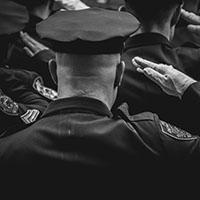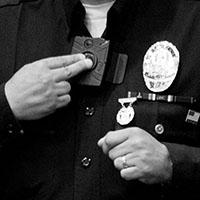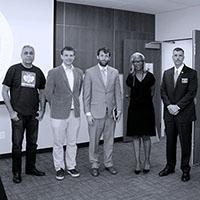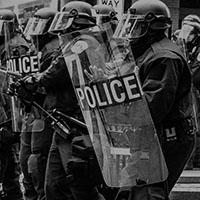.png)
The Los Angeles Police Department and the Los Angeles Sheriff's Department are among the largest policing organizations in the nation, and indeed the world. These institutions are responsible for serving and protecting around 14 million people. The community of Los Angeles is an economically, socially and demographically diverse group that presents multiple, complex challenges to social welfare, public order and crime control. In facing these challenges, LAPD and the Sheriff's Department, along with the federal law enforcement agencies, are at the forefront of police organization and police tactics worldwide. What happens in Los Angeles, historically and currently, sets the standards for policing around the globe.
The goal of the Policing Los Angeles Forum is to provide a forum in which to discuss core developments in police organization and policing in Los Angeles; to evaluate their impact on the communities around the city; and to develop strategies for innovation and change. We seek to create a series of conversations about Policing Los Angeles, seeking input from diverse groups, including LAPD and L.A. County Sheriff's Department, as well as the police unions; members of the Los Angeles, California and United States legislative and executive officials; city, state, and federal prosecutors and defense counsel; local NGOs and civic activists; academic experts; members of the media; the Loyola student body; and the Los Angeles public. The Policing Los Angeles Forum Series plans to focus on five overlapping issues: technological innovations in policing; privatization of policing functions; bail reform; police administration and policy-making; and police recruitment and training.
Police and Community Relations Survey
-
The Sheriff often reminds local politicians that he is a “constitutional officer” who answers to nobody except the voters of Los Angeles County. But the Board of Supervisors provides all the funding for the Sheriff’s Department and it has an obligation to oversee how those funds are used. Can the Board implement oversight and restrictions on the Sheriff’s power?
-
LMU Loyola Law School faculty played a leading role in Los Angeles District Attorney George Gascón’s transition team. Transition team members discussed the initiatives driving DA Gascón’s policies on juvenile justice, conviction review, immigration reform and death penalty prosecution. The team members addressed both their hopes for progressive reform of the largest prosecutor’s office in the nation along with some of the challenges the think the DA faces.
-
The President’s Commission on 21st Century policing proposed a number of legal reforms for improving policing. This panel will discuss whether the L.A. Sheriff’s Department and the LAPD have implemented any of these reforms.
-
The Policing Los Angeles Forum series at LMU Loyola Law School hosted “Decriminalizing Mental Illness in Los Angeles County: Policies & Practices” on Thursday, Nov. 7 on its downtown L.A. campus. The event honored Patrisse Cullors, a co-founder of the Black Lives Matter movement, with the inaugural Center for Juvenile Law & Policy Award for Public Service & Social Justice.
Co-sponsored by the American Constitution Society and The Justice Collaborative, the symposium featured an array of policymakers and stakeholders. Practitioners, advocates and impacted community members reviewed the criminalization of mental illness in Los Angeles County, including its historical context, and discussed a roadmap for treatment-based alternatives to incarceration in L.A.
-
In the wake of myriad controversial police shootings of unarmed people, the California Legislature enacted AB-392, The California Act to Save Lives. AB-392 changes the legal standard for the use of deadly force by law enforcement from “reasonableness” to “necessity.” As such, a police officer is no longer justified in shooting a suspect or person in crisis unless there are no other less violent alternatives. Remarkably, police unions, which have historically lobbied against such a change, did not oppose AB-392. The panel will discuss the new standard and its expected impact on police shootings in Los Angeles.
-
Community activists won important reforms in 2019, such as prompting the California Legislature to require prompt disclosure of police body-worn camera footage of controversial police shootings, as well as forcing the Los Angeles County Board of Supervisors to scrap a planned $1.7 billion new “mental health jail.” In 2020, activists will seek to convince voters to give the Civilian Oversight Commission subpoena power to ensure that the public is receiving full information from the Sheriff’s Department. The panel will discuss the important role that community activism plays in forcing traditional governmental institutions to implement reforms of policing and prosecution in Los Angeles.
-
Los Angeles County Sheriff’s Commissioner and Loyola Law School Professor Sean Kennedy will discuss the standards that apply to police interrogation and the handling and exclusion of criminal evidence both domestically and internationally, to help understand the ways in which the American system fails to provide adequate checks on the police and can be improved. In addition, Policing Los Angeles Forum welcomes international panelist Dimitrios Giannoulopoulos, holder of the Inaugural Chair in Law at Goldsmiths College, London, UK.
-
Bail Reform in California will be a major issue heading into the next election, as SB10 has been placed on the November 2020 ballot. The senate bill proposes to replace cash bail with a risk-assessment based system that would determine whether criminal defendants are a flight risk. The risk-assessment system has received significant objections from both bail bondsmen, who will lose their businesses, but also from advocates on the left, who argue that the risk-assessment tools are racially skewed, and so will have a racially disparate impact that may ultimately be even worse than the current money bail system. Our panelists will include Priscilla Ocen, a Loyola Law professor and member of the Los Angeles County Sheriff Civilian Oversight Commission.
-
There are unique challenges on all sides for policing people who are homeless. The newest installment of the Policing Los Angeles Forum Series will examine police practices and review how lawyers can best help homeless clients. PANELISTS: Gary Blasi, Professor of Law Emeritus, UCLA School of Law; Kath Rogers, Executive Director, National Lawyers Guild Los Angeles; Carol A. Sobel, Partner, Law Office of Carol A. Sobel. MODERATOR: Eric J. Miller, Loyola Law School, Los Angeles.
*Please note, due to technical issues, the audio is distorted.
-
 The Los Angeles County District Attorney keeps a list of police officers' whose disciplinary records indicate a history of dishonesty and similar misconduct. These records are often called "Pitches" records, after a California State case that establishes an officer's right to privacy in these records. That law, backed up by California statute, makes it difficult for criminal defendants to obtain the disciplinary records of police officers. Our panel will discuss whether individual officers' disciplinary records should be made public. It looks at the benefits to making such records public in courtroom situations and the drawbacks to more public availability.
The Los Angeles County District Attorney keeps a list of police officers' whose disciplinary records indicate a history of dishonesty and similar misconduct. These records are often called "Pitches" records, after a California State case that establishes an officer's right to privacy in these records. That law, backed up by California statute, makes it difficult for criminal defendants to obtain the disciplinary records of police officers. Our panel will discuss whether individual officers' disciplinary records should be made public. It looks at the benefits to making such records public in courtroom situations and the drawbacks to more public availability. -
 Big data technologies are revolutionizing policing. At this Policing Los Angeles Forum, panelists will explore how data-driven surveillance technologies impact everyday policing and concerns about racial bias, transparency and the erosion of constitutional rights.
Big data technologies are revolutionizing policing. At this Policing Los Angeles Forum, panelists will explore how data-driven surveillance technologies impact everyday policing and concerns about racial bias, transparency and the erosion of constitutional rights. -
 Since Terry v. Ohio, courts have recognized that peaceful police encounters on the street may escalate into more serious uses of force. More worryingly, excessive discretionary arrests and the use of force by officers can reduce public trust in the police. The lack of trust between police and public, public and police, risks entrenching escalation as an inevitable feature of the encounter. The solution would seem to be adopting training protocols to reduce escalation and emphasize safe de-escalation of confrontational encounters. To date, there is scant evidence as to how police departments can successfully train officers to balance enforcement and public trust in the field. Professor Emily Owens participated in a recent study, demonstrating that a relatively minor supervisory intervention may cause substantive changes in how police and citizens interact with each other. We will discuss her study, and other ways in which the police do and should engage in de-escalation as a policy when policing the public.
Since Terry v. Ohio, courts have recognized that peaceful police encounters on the street may escalate into more serious uses of force. More worryingly, excessive discretionary arrests and the use of force by officers can reduce public trust in the police. The lack of trust between police and public, public and police, risks entrenching escalation as an inevitable feature of the encounter. The solution would seem to be adopting training protocols to reduce escalation and emphasize safe de-escalation of confrontational encounters. To date, there is scant evidence as to how police departments can successfully train officers to balance enforcement and public trust in the field. Professor Emily Owens participated in a recent study, demonstrating that a relatively minor supervisory intervention may cause substantive changes in how police and citizens interact with each other. We will discuss her study, and other ways in which the police do and should engage in de-escalation as a policy when policing the public. -
 Sanctuary cities and states are jurisdictions in which the local police department does not automatically refer individuals with immigration offenses to the federal authorities, including ICE. California is a sanctuary jurisdiction, and the Los Angeles Police Department and Los Angeles County Sheriffs are tasked with enforcing the law under SB54, the sanctuary law. Our panelists will discuss the issues presented by complying with state and federal law, and propose some ways in which the police can ensure they abide by SB54.
Sanctuary cities and states are jurisdictions in which the local police department does not automatically refer individuals with immigration offenses to the federal authorities, including ICE. California is a sanctuary jurisdiction, and the Los Angeles Police Department and Los Angeles County Sheriffs are tasked with enforcing the law under SB54, the sanctuary law. Our panelists will discuss the issues presented by complying with state and federal law, and propose some ways in which the police can ensure they abide by SB54. -
 Video evidence from police body cameras often proves decisive in criminal and civil cases, especially where the only other evidence is the testimony of the police officer and the criminal suspect. Panelists will discuss policies governing the retention and use of video evidence at trial or as part of the plea bargaining process.
Video evidence from police body cameras often proves decisive in criminal and civil cases, especially where the only other evidence is the testimony of the police officer and the criminal suspect. Panelists will discuss policies governing the retention and use of video evidence at trial or as part of the plea bargaining process. -
 The panel will discuss the law and policy surrounding the collection and dissemination of police-worn body camera video. The video is often important evidence when force is used. But police body camera video also raises important privacy concerns, both for the police officers and the public who are captured on the video.
The panel will discuss the law and policy surrounding the collection and dissemination of police-worn body camera video. The video is often important evidence when force is used. But police body camera video also raises important privacy concerns, both for the police officers and the public who are captured on the video. -
 Are privately written police policies in the public interest? It depends on whom you ask, guests learned at the Police Policy-Making event held on Tuesday, Jan. 30, 2018. Moderated by Loyola Law School Professor Eric J. Miller, Leo J. O'Brien Fellow, the panel featured law-enforcement scholars, police watchdogs and a police chief.
Are privately written police policies in the public interest? It depends on whom you ask, guests learned at the Police Policy-Making event held on Tuesday, Jan. 30, 2018. Moderated by Loyola Law School Professor Eric J. Miller, Leo J. O'Brien Fellow, the panel featured law-enforcement scholars, police watchdogs and a police chief.